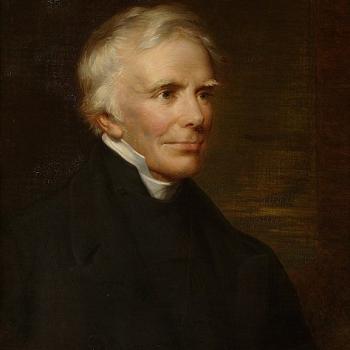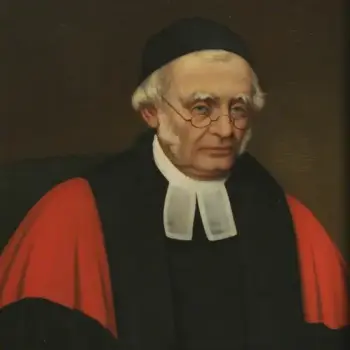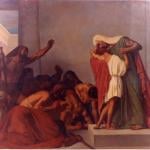
Presbyterian Keith A. Mathison (M.A. Reformed Theological Seminary; Ph.D. Whitefield Theological Seminary) is the author of The Shape of Sola Scriptura (Moscow, Idaho: Canon Press, 2001): a book that many Protestants and Catholics alike believe to be the best recent defense of sola Scriptura. In 2012, I wrote a reply-article, “Solo” Scriptura vs. Sola Scriptura: Reply to Keith Mathison, which was in response to Keith’s article, “A Critique of the Evangelical Doctrine of Solo Scriptura“ (which in turn was taken from his book: pp. 237-253). As is usually the case with our illustrious brothers in Christ from the small anti-Catholic camp of Protestantism, no reply to it was ever received.
Currently, I reply to Keith’s article, Solo Scriptura, Sola Scriptura, and Apostolic Succession: A Response to Bryan Cross and Neal Judisch (by Keith Mathison) (Thoughts of Francis Turretin blog, 2-15-11). His words will be in blue. I won’t be defending any arguments of Cross and Judisch (that’s their burden, and they are fully capable), and will be concentrating primarily on Keith’s pro-sola Scriptura arguments in his very long article.
*****
the primary issue in this debate is not the doctrine of Scripture. It is the doctrine of the Church.
That’s how Protestants usually “spin” the argument. They can’t establish defend sola Scriptura from Scripture alone (which logically they must do), and so they frequently switch the topic over to Catholic ecclesiology, to get the spotlight off of their weak view. Technically, this is not defending their own position (it’s critiquing one of ours).
That said and understood, it’s also true that sola Scriptura began when Luther was backed into it in the Leipzig Disputation in 1519, almost as a desperate default position, when he expressly denied the infallibility of the Church and tradition (as I recently wrote about). The doctrine of the Church’s authority is indeed closely related to this discussion, but I deny that it is the supposed “primary issue.” This may seem to be quibbling, but presuppositions are very important in any debate, and often determine the direction or emphasis of the discussion.
In the same way, Protestant claims are going to be intrinsically offensive to Roman Catholics. Protestants are questioning things Roman Catholics hold sacred. The only relevant question, however, is whether certain claims are true, not whether those claims offend someone’s sensibilities. In sum, while things will be said in my response that Roman Catholics will undoubtedly find offensive, I do not know of any way to avoid it completely in this discussion. I trust that Roman Catholic readers will understand that my purpose in this response is not to offend for the sake of offending but to deal with the issues.
I fully agree; and vice versa; in opposing and revealing the fatal weaknesses of sola Scriptura, we critique one of Protestantism’s most deeply held “sacred cows”; one of its two self-described “pillars”. I’m not personally offended or emotionally threatened by any of these arguments. My job as an apologist is to seek and to defend truth, as best I can determine it. And I always seek to do that as objectively, rationally, and scripturally as I possibly can. I’ve written more about this topic than any other one in my 34 years of writing Catholic apologetics, oversee a huge web page on Bible and Tradition, and have authored three books (one / two / three) on the topic. So I think I have a few things to say that may be helpful to some folks in working through this all-important issue of Christian authority and the rule of faith.
A final preliminary observation is in order. One of the most frustrating difficulties encountered in discussions such as this is the fact that the starting assumptions of Roman Catholics and non-Roman Catholics are so different. Because these starting assumptions dramatically affect the way we read and evaluate evidence and arguments, it becomes difficult to avoid speaking past one another.
Very true. And this is where dialogue can be particularly helpful. If we directly interact with another view it’s difficult to talk past one another (i.e., if both parties are willing to truly dialogue and not simply engage in “mutual monologue”). So here we are!
For example, as I mentioned above, if one assumes the correctness of the Roman Catholic doctrine of the church, then the differences I allege between sola scriptura and solo scriptura become invisible.
I don’t think that: to an extent. As I wrote in my first reply:
I gladly acknowledge that there are several significant and noteworthy distinctions between the two views to be rightly made. I understood this as a Protestant, prior to 1990, when I read about this very issue in knowledgeable evangelical and Calvinist writers like Bernard Ramm, R. C. Sproul, and G. C. Berkouwer. . . .
I part company, however, concerning whether SAS [sola Scriptura] overcomes the fundamental difficulties that it claims bring down SOS [“solo” Scriptura], but not SAS. I believe SAS (i.e., in its more respectable manifestations such as Mathison’s) is a noble attempt to salvage a hopeless position. It’s a valiant effort which is inevitably doomed to failure. All forms of sola Scriptura, no matter how nuanced and sophisticated, ultimately fail to pass biblical and logical scrutiny.
Those who do not begin with the basic theological axiom of Roman Catholicism see abundant evidence against the claims of Rome in Scripture, the writings of the Church Fathers, and the documented events of church history. This evidence prevents them from believing that the Roman Catholic Magisterium has divine authority.
Those who do not begin with the basic theological axiom of Protestantism see abundant evidence against the claims of Protestantism in Scripture, the writings of the Church Fathers, and the documented events of Church history. This evidence prevents them from believing that Protestantism supersedes the divine authority of the Catholic Magisterium.
For those who adopt the basic theological axiom of Roman Catholicism, all of this “alleged” evidence essentially ceases to exist.
It doesn’t cease to exist. It’s still out there. Our task as Catholic apologists is to show how it is erroneous falsehood, based on Scripture, reason, and historical fact. I’ve done this in multiple hundreds of articles and in many of my 55 books.
From the perspective of the non-Roman Catholic, the Roman Catholic is doing something comparable to reading a red-letter Bible with red tinted glasses. If he sets aside the glasses, he can see all the words printed in red. If he puts the glasses on, all the words printed in red disappear from his sight.
From the perspective of the Catholic, the Protestant is doing something comparable to reading a red-letter Bible with red tinted glasses. If he sets aside the glasses, he can see all the words printed in red. If he puts the glasses on, all the words printed in red disappear from his sight. I wrote an entire book about this very common phenomenon, entitled, The Catholic Verses: 95 Bible Passages That Confound Protestants (Aug. 2004).
After spending about a third of his effort in his lengthy article critiquing Catholic ecclesiological reasoning (all of which I have defended many times and need not do so again here), Keith writes:
At this point, I will turn to the question of whether there is a principled difference between sola scriptura and solo scriptura with respect to the holder of ultimate interpretive authority and to the question of apostolic succession. . . .
According to Cross and Judisch, sola scriptura entails the indirect way of making oneself one’s own ultimate interpretive authority. They argue that sola scriptura does not truly allow for the interpretive authority of the church.
This is correct. In the final analysis, or ultimately, or as a logical reduction (and reductio ad absurdum, too, I would add), it does indeed devolve to the individual’s private judgment and conscience. I’ve written about this crucial aspect many times, but here is how I argued it less than three weeks ago:
Luther’s big problem in this regard, per the “theory” above, was his extreme naivete: thinking that everything would be fine and dandy in his new system and never being able to conceptualize the quite arguable connection between it and the proliferation of sects.
It’s real simple in the final analysis: others applied Luther’s new rule of faith (sola Scriptura, private judgment, and a distorted individualistic supremacy of conscience) and went their own way, differing from Luther, just as he had with the Catholic Church. Any astute observer could have easily predicted what happened. Erasmus and More and Eck could see what was coming, in their disputes with Luther. But Luther couldn’t (or wouldn’t, one might opine). . . .
The causes and the solutions are what is at issue between Protestants and Catholics. Luther and Calvin and Melanchthon apparently never figured out that it was their foundational principles which set the wheels of this sad process inexorably and inevitably in motion. The weakness, I submit, is in the foundation, not the superstructure of denominationalism gone wild. Calvin and Melanchthon were embarrassed — as well they should have been — at the “absurd” (as Calvin put it) nature of such strong disagreements occurring, and the “miserable anarchy.”
To their credit, they felt this tension, expressed it in private letters, and wished that it could be resolved before “posterity” got wind of it. They understood the scandalous, indefensible scandal of sectarianism and denominationalism in a way that few Protestants today do (after 500 years of rationalizing and pretending that it is a good, healthy thing).
But Calvin and Melanchthon didn’t understand or know how to properly solve the problem of relativism and Protestant “epistemology”. That’s my take, and it seems obvious to me. They were referring to the public and history’s reaction to the dissensions. They “got it.” The founders of the Protestant system (including Luther) thought that Protestant divisions were scandalous. This has been a problem since Day One: Luther at Worms in 1521. Private judgment and sola Scriptura inevitably produce such doctrinal relativism and ecclesiological confusion. . . .
In my opinion, Calvin, in the letter above to Melanchthon, and the sensitive Melanchthon, in his various despairing utterances, are rightly and admirably aghast with regard to a situation (division) which is equally alarming to us Catholics. In this instance they agree with us and candidly, honestly admit the strong contradiction between sectarianism and the Bible. But like Luther, they don’t see that the discord resulted from fallacious first principles, just recently conceived by their illustrious predecessor. . . .
They thought everyone would simply agree with them and that there would be this spontaneous, marvelous unity out under the “yoke of Rome.” Their novel views brought about what we see, despite whatever good intentions they had (which I readily grant them). But of course, they couldn’t even agree with each other.
*
***
“Please Hit ‘Subscribe’”! If you have received benefit from this or any of my other 4,600+ articles, please follow this blog by signing up (with your email address) on the sidebar to the right (you may have to scroll down a bit), above where there is an icon bar, “Sign Me Up!”: to receive notice when I post a new blog article. This is the equivalent of subscribing to a YouTube channel. Please also consider following me on Twitter / X and purchasing one or more of my 55 books. All of this helps me get more exposure, and (however little!) more income for my full-time apologetics work. Thanks so much and happy reading!
***
Galatians 1:18-19 . . . after three years I went up to Jerusalem to visit Cephas, and remained with him fifteen days. [19] But I saw none of the other apostles except James the Lord’s brother.
Galatians 2:9 . . . when they perceived the grace that was given to me, James and Cephas and John, who were reputed to be pillars, gave to me and Barnabas the right hand of fellowship,
Acts 16:4 As they [he and Timothy] went on their way through the cities, they delivered to them for observance the decisions which had been reached by the apostles and elders who were at Jerusalem.
Acts 13:1-4 Now in the church at Antioch there were prophets and teachers, . . . [2] While they were worshiping the Lord and fasting, the Holy Spirit said, “Set apart for me Barnabas and Saul for the work to which I have called them.” [3] Then after fasting and praying they laid their hands on them and sent them off. [4] So, being sent out by the Holy Spirit, they went down to Seleu’cia; and from there they sailed to Cyprus.
I guess, then, that Baptists and all who deny baptismal regeneration aren’t part of the universal Church, by this criterion (since they deny part of the creed or confession that represents same). Keith set it up; I’m merely mentioning some of the “anomalous” consequences of the mistaken reasoning.
*
Practical Matters: Perhaps some of my 4,600+ free online articles (the most comprehensive “one-stop” Catholic apologetics site) or fifty-five books have helped you (by God’s grace) to decide to become Catholic or to return to the Church, or better understand some doctrines and why we believe them.
Or you may believe my work is worthy to support for the purpose of apologetics and evangelism in general. If so, please seriously consider a much-needed financial contribution. I’m always in need of more funds: especially monthly support. “The laborer is worthy of his wages” (1 Tim 5:18, NKJV). 1 December 2021 was my 20th anniversary as a full-time Catholic apologist, and February 2022 marked the 25th anniversary of my blog.
PayPal donations are the easiest: just send to my email address: apologistdave@gmail.com. Here’s also a second page to get to PayPal. You’ll see the term “Catholic Used Book Service”, which is my old side-business. To learn about the different methods of contributing (including Zelle), see my page: About Catholic Apologist Dave Armstrong / Donation Information. Thanks a million from the bottom of my heart!
*
***
*
Photo Credit: Nicholas Mutton (2-23-08). Port Bannatyne Pier [UK] and sinking boat [Wikimedia Commons / Creative Commons Attribution-Share Alike 2.0 Generic license]
Summary: Presbyterian Keith Mathison, the best current defender of sola Scriptura, makes a lengthy case for it, in reply to two former Reformed Protestant Catholics. I respond in depth.













